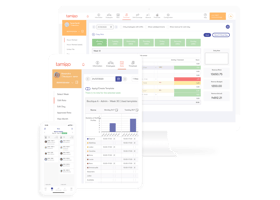Retailers are used to the challenges of high staff turnover. But in recent years, staff shortages have been at record highs. AI scheduling is a new tool for retailers to fight this alarming trend.
Waves of redundancies in the retail sector: an industry in transition
Low employee retention has long been the norm for Europe’s retailers. In the UK, staff turnover rates have been averaging around 30% for years – significantly higher than other industries.
The results: Firstly, a big wave of layoffs. And secondly, employees who remain are faced with punishing workloads. This has led many to reconsider their current employment.
More than one in five adults in Germany is currently considering changing jobs. And more than one in three retail companies recorded staff shortages last year.
As a result, retailers are facing three major challenges. Let's take a look at them.
Siloed planning vs. optimised workforce management: the battle for efficiency
In retail, attracting customers and offering a first-class shopping experience is essential. But what happens when staff are in short supply?
The challenge is to have the right products available at the right time. Orders and deliveries have such a significant impact on staffing requirements.
Separate planning processes, such as supply chain and staff planning — known as siloed planning — can cause significant problems. Understaffing leads to poor customer service, while inefficient planning pushes up labour costs.
The solution lies in overcoming siloed scheduling, by integrating your supply chain and workforce management processes.
Planning by gut feeling: a nightmare for head office
Conventional staff scheduling in retail is often based on manual processes and the planners' gut feeling. This inevitably leads to errors and inefficiencies. Without data-supported insights, there’s a lack of precise forecasts for staff requirements and effective resource allocation.
In today’s dynamic retail landscape, factors such as weather, local events, public holidays and vacation periods have a decisive influence on demand.
The solution: artificial intelligence or AI scheduling. They serve as a supporting tool for workforce planning, automating and optimising the planning process based on precise forecasts which takes every factor into account.
The result are schedules that meet contract requirements, legal regulations and employee preferences. At the same time, they match actual demand. However, store managers always retain final say control over schedules, so they can tailor them as needed.

Manual workforce management: a source of unwanted chaos
Staff scheduling in retail quickly becomes complex. There are often many different working time models in stores. In addition, there’s the frequent shift swaps, no-shows, and working time compliance issues.
Nevertheless, many retailers still rely on outdated manual planning tools such as spreadsheets or pen and paper. These tools quickly show their limitations — especially for companies with multiple locations.
This means that store managers spend hours creating and changing schedules. Errors invariably creep in, and last-minute changes can cause big disruptions if the relevant staff aren’t kept up to date.
What's more, these methods are often not linked to overarching reporting systems. This makes it difficult to gain insights and align the schedules with budgets.
AI scheduling as a game changer for your company
Increasing staff turnover and growing staff shortages in the retail sector are forcing retailers to plan their workforce more efficiently. This is why we are working with RELEX Solutions. Together, we offer a unified AI-powered solution that enables optimal operations for all departments and locations.
Combined with RELEX's AI-powered workload forecasting and shift optimisation, our cloud-based workforce management software makes it easy for your planners to publish compliant, high-quality shifts directly through our web-based and mobile tamigo platform. RELEX uses AI algorithms to accurately schedule store work, considering all relevant factors.
This helps you optimise daily operations and minimise overstaffing and understaffing. Equipped with these AI-based schedules, all downstream operational processes become a breeze.
Would you like to improve staff scheduling in your company? Visit our retail industry page to learn.






